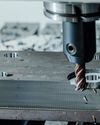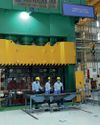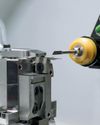
THE INTERGOVERNMENTAL PANEL ON CLIMATE CHANGE (IPCC) paints a very stark picture for the future of our planet unless deep reductions in greenhouse gas (GHG) emissions occur in the coming decades. The 2015 Paris Agreement aims to avoid this by capping the rise of global warming to 'well below 2°C'.
"Industry is responsible for 23% of global emissions and represents the second-highest source of emissions after energy generation systems, according to non-governmental organization (NGO) Energy & Climate. At COP26, a decisive moment to spur industrial decarbonization, several decisions were made to improve the sustainability of manufacturing and achieve the net-zero emissions goal," Anders Dellblad, Manager of Sustainable Supply at Sandvik Coromant notes.
LEAN AND GREEN
The term green factories coined a few years ago, used to describe a manufacturing plant that is equipped with eco-friendly design and manufacturing processes that improve greenhouse gas emission, environmental pollution and energy consumption. In other words, a green factory is a greener workplace, with greener processes, producing greener products.
Here, "green" is not a hollow word. For a facility to truly be a green factory, it must display tangible ways to drive sustainable practices within the factory, the supply chain and across its customer base. For example, a company looking to build a green factory may invest in measures that reduce scrap rates and machine idling time by optimizing the factory floor layout, or it may take steps to generate, use and recover heat more efficiently, like installing highefficiency burners that also recover waste heat. It may also want to minimize the distances that parts travel across the supply chain, like COP26's green corridors proposal, or convert its waste into reusable material.
Esta historia es de la edición September 2022 de Manufacturing Today.
Comience su prueba gratuita de Magzter GOLD de 7 días para acceder a miles de historias premium seleccionadas y a más de 9,000 revistas y periódicos.
Ya eres suscriptor ? Conectar
Esta historia es de la edición September 2022 de Manufacturing Today.
Comience su prueba gratuita de Magzter GOLD de 7 días para acceder a miles de historias premium seleccionadas y a más de 9,000 revistas y periódicos.
Ya eres suscriptor? Conectar

Optimising milling operations
Exploring innovative strategies that are reshaping the milling landscape to meet the challenges of a competitive global market.

The path to excellence
Tata AutoComp’s Double Deming triumph is testament to quality and innovation

Boosting India's energy efficiency with advanced low voltage motors
Stefan Floeck, Division President of IEC Low Voltage Motors at ABB Motion, discusses the role of low voltage motors in India’s industrial future.

The Tech of E-commerce
Technology is revolutionising e-commerce by enhancing demand forecasting, inventory management, and customer experiences through AI, blockchain, IoT, and real-time data analytics.

Driving Sustainability and Innovation
A conversation with Rajendra B Chunodkar, President Manufacturing Operations, Lupin

The evolution of machining technologies
The evolution of machining technologies is reshaping the manufacturing landscape, offering unprecedented opportunities for efficiency, precision, and sustainability.

Transforming the future of manufacturing technology
A pre-event report on IMTEX 2025: The premier manufacturing and metal cutting technologies event for

THE MAKE IN INDIA JOURNEY
An analysis of the initiative's impact on the manufacturing sector.

Tata Motors Re.Wi.Re: Innovation meets responsibility
Tata Motors advances circular economy via Re.Wi.Re scrapping facility.
After Apple, Google Pixel set to be manufactured in India
Dixon Technologies' alliance with Compal Electronics is poised to further accelerate India's push to become a global hub for smartphone manufacturing.